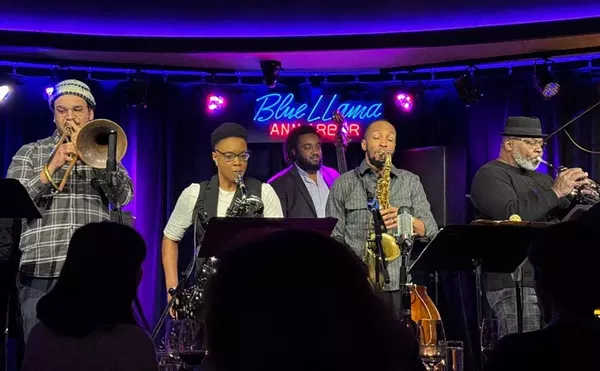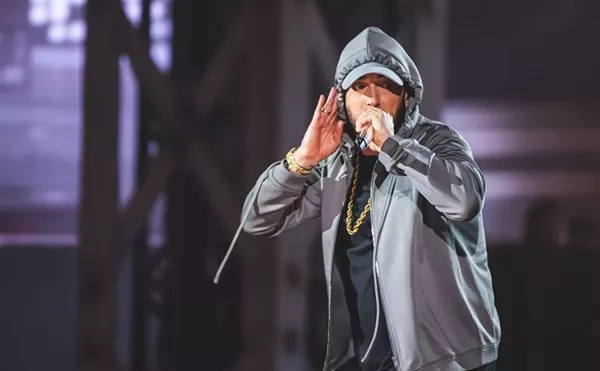Amid the fireworks of this Ellington centennial – Edward Kennedy Ellington would have been 100 on April 29 – we've culled from Ellington's autobiography and six decades of quotes to fashion a medley.
Metro Times: Given the difficulties, we really appreciate being for this interview and ...
Duke Ellington: Inner-view. Call it an inner-view. You know, I'm not really dressed for this sort of thing, but let me light a cigarette so I can look sophisticated.
MT: How do you feel about the Pulitzer after what those folks put you through in '65?
Ellington: I never do give any thought to prizes. I work and I write. And that's it. My reward is hearing what I've done.
MT: Your career spans so much of American music. We could use all our allotted time just talking about the excitement of the '20s.
Ellington: Virtuoso combat was the most popular sport for the professional musician in those days. I shall never forget the night Fats Waller and James P. Johnson tangled. And then there was the night that King Oliver met up with Fletcher Henderson's band. Oh, I wish we had a tape of that night. Another incident in the '20s that comes to mind was when we played New Port, R.I., for the first time. A gentleman had been wheel-chaired into the hall, and half-way through the dance he jumped up and started doing his thing! Everybody in the dancehall was quite shocked, because his daughter said her father had not been out of that wheelchair in 12 years.
MT: Your compositions are classics now, but at the time you seemed to break rules right and left.
Ellington: When I became what might be called an active musician, I discarded most of the rules I learned and found my greatest success in doing things that my harmony instructors had warned me against; but that was in the air then, just as its in the air today. Some people said that my music is uncouth and without form – a weird conglomeration of blatant chords which never has, and never will, mean anything at all. But anyone can do it with a formula, sweetie. The trick is to do it without one.
MT: But breaking rules creates problems.
Ellington: That's skilapooping -- the art of making what you're doing look better than what you're supposed to be doing. I always consider my problems opportunties to do something. Like Jimmy Valentine or Houdini. Necessity, in other words, is the mother! But I couldn't work without a deadline. If I retired to some luxurious home by the sea, you know what I'd write? Nuthin!
MT: You're also famous for building a band out of distinct musical personalities and writing for them specifically.
Ellington: It's not the notes that are important, it's who they're written for. Before you can play anything or write anything, you must hear it. If I didn't know who I was writing for, I wonder what I'd write. And again I must confess that I find a problem or a limitation to be a great opportunity. When you write for a musician whose method allows him only seven good tones on his instrument, you have an opportunity to devise a design that is agreeable to the ear. With a musician who plays the full compass of his instrument ... there seems paradoxically less opportunity to create.
MT: When he described your recruitment pitch, Barney Bigard made you sound like one of the great motivational speakers of all time.
Ellington: To think that I had the good taste to select Barney Bigard, Wellman Braud, Harry Carney and all the rest! I'm just a victim of my own good taste. I am the world's greatest listener. Here I am still getting cats out of bed to come work so I can listen to them and so that they can make a living for their own families.
MT: Every other leader at some point or another broke up his orchestra, took a breather and got a fresh start. You could have done the same.
Ellington: What do people do who rest? If you just stay home for a while and listen to what the other kids are doing out there on the battlefield, you may see where this one made a lot of mistakes, or where that one missed a great opportunity, but on the other hand, you get more fears. You may read where so-and-so lost this particular battle and so many were washed away, and it's all a little terrifying. If you come out from home cold – bang!
MT: Not a pleasant thought. What if Duke Ellington hadn't become a musician?
Ellington: Someone once said, I'd have made a very good criminal lawyer, but I worry more about how well I would not have done as a criminal. What kind of music would I have written while locked up in those dingy old prison cells?
MT: I was expecting you to talk about being a visual artist. You had a scholarship to study art at Pratt Institute, and no one can write at length about your music without talking in visual metaphors, tone colors, etc.
Ellington: Composers try to parallel observations made through all the senses. Take a waterfall – you can always see the top and you can always hear the bottom. So you've got the top and the bottom and you can put anything you want in between.
MT: The musical vision of "Harlem Airshaft" comes to mind.
Ellington: So much goes on in a Harlem airshaft. You hear fights, you smell dinner, you hear the radio. An airshaft is one great big loudspeaker. You see your neighbor's laundry. You hear the janitor's dogs. The man upstairs' aerial falls down and breaks your window. You smell coffee. An airshaft has got every contrast. You hear people praying, fighting, snoring. I tried to put all that in.
MT: Women are also central images in your work. "Satin Doll," "Sophisticated Lady"; your autobiography is entitled Music Is My Mistress. Yet your mistress often seems elusive.
Ellington: A system of ribbons, a multiplicity of ramifications, sparkling from her brain down through her core, a million facets of gossamer sensations. When you don't hear her, you desperately miss her, and when you embrace her, you wish you could kiss her.
MT: Your compositions are embedded deep into the memories of generations of Americans. But some of them are, themselves, recreations of your memories.
Ellington: The memory of things gone is important to a jazz musician. Things like old folks singing in the moonlight in the backyard on a hot night, or something someone said long ago. I remember I once wrote a 64-bar piece about a memory of when I was a little boy in bed and heard a man whistling in the street outside, his footsteps echoing away. Things like these may be more important to musicians than technique.
MT: You once described bebop as playing Scrabble with the vowels. Were you joking?
Ellington: The other night I heard a cat on the radio, and he was talking about "modern" jazz. So he played a record to illustrate his point, and there were devices in that music I heard cats using in the 1920s. Those large words like "modern" don't mean anything. Everybody who's had anything to say in this music -- all the way back -- has been an individualist. … I don't listen in terms like "modern" jazz. I listen for those individualists. Like Charlie Parker was.
MT: But what about the revolutionary music of the '60s and on.
Ellington: When I hear something new, I will give you an honest answer.
MT: And about the way rock 'n' roll supplanted jazz?
Ellington: I don't know how anyone can even consider asking such a question! Rock 'n' roll is the most raucous form of jazz beyond a doubt; it maintains a link with the folk origins, and I believe that no other form of jazz has ever been accepted so enthusiastically by so many.
MT: What does jazz have to teach America?
Ellington: Jazz is freedom. Jazz is freedom to play anything, whether it has been done before or not.
And freedom is a word that is the foundation of our country.
MT: I've always been struck by what you said about freedom in regard to Billy Strayhorn, just after he lost his fight with leukemia.
Ellington: He demanded freedom of expression and lived in what we consider the most important of moral freedoms: freedom from hate, unconditionally; freedom from self-pity (even throughout all the pain and bad news); freedom from fear of possibly doing something that might help another more than it might help himself; and freedom from the kind of pride that could make a man feel he was better than his brother or neighbor.
MT: You were criticized for not being more prominent in the civil rights movement.
Ellington: We've done more benefits for civil rights groups than anybody, and I don't think there's any doubt about how we felt concerning prejudice. But still the best way for me to be effective is through music. Social pride in the history of the Negro have been the most significant themes in what we've done. We've been talking about what it is to be a Negro in this country for a long time.
MT: Quick question -- Your house is on fire. What would you grab first?
Ellington: I would grab the old Sonny Greer adage: "Feet save ass, ass do feet a good turn someday."
MT: Another quick one– How do you stay so cool?
Ellington: One can be as cool as one wishes to be.
MT: Back to the Pulitzer. You must have felt something when you were denied the prize the first time.
Ellington: Fate was being kind to me. Fate didn't want me to be famous too young.
The quotes (and paraphrases that find their way into the questions) come from the following books:
Celebrating the Duke, and Louis, Bessie, Billie, Bird, Carmen, Miles, Dizzy and other Heroes - Ralph J. Gleason (Atlantic Monthly Press)
The Duke Ellington Reader - Mark Tucker, editor (Oxford University Press)
Music is My Mistress - Edward Kennedy Ellington (Doubleday & Company)
With Louis and the Duke - Barney Bigard (Oxford University Press)
The World of Duke Ellington - Stanley Dance (Da Capo Press)
And these anthologized articles:
"A Day with the Duke" - Whitney Balliet in American Musicians: 56 Portraits in Jazz - Whitney Balliett (Oxford University Press)
"Jazz and the Duke" - Gordon Parks in Mom, the Flag, and Apple Pie: Great American Writers on Great American Things - the editors of Esquire (Doubleday)
W. Kim Heron is Metro Times managing editor. Send comments to [email protected].





